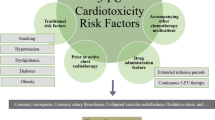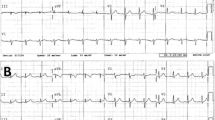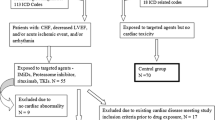Abstract
Purpose of Review
Fluoropyrimidine (FDP) chemotherapy regimens used in the treatment of solid tumors such as breast, gastrointestinal, and hepatobiliary malignancies have led to significant survival benefits. However, FDP cardiotoxicity can lead to premature termination of FDP-based chemotherapy treatments. Resuming these crucial therapies after initial FDP cardiotoxicity can be challenging for patients and healthcare providers.
Recent Findings
Symptomatic cardiotoxicity occurs in up to 35% of patients treated with FDP-based chemotherapy. The most common symptom is chest pain, but palpitations, dyspnea, myocardial infarction, cardiogenic shock, and cardiac arrest can also occur. Several large studies have attempted to discern clinical and genetic risk factors in those who develop FDP cardiotoxicity. With cardiac risk factor optimization and aggressive pre-treatment with anti-anginal agents, rechallenging with FDP is possible and allows patients to resume optimal cancer-directed treatment.
Summary
FDP cardiotoxicity remains a poorly understood identity. We highlight several recent publications attempting to define the risk factors associated with developing FDP cardiotoxicity. The management of FDP cardiotoxicity and consideration of rechallenge of FDP-based regimens highlights the importance of a multidisciplinary partnership between oncologists and cardiologists/cardio-oncologists.

Similar content being viewed by others
References
Papers of particular interest, published recently, have been highlighted as: • Of importance •• Of major importance
FLUOROURACIL injection [package insert] [Internet]. Spectrum Pharmaceuticals, Inc. Available from: https://www.accessdata.fda.gov/drugsatfda_docs/label/2016/012209s040lbl.pdf.
Capecitabine Food and Drug Administration Label [Internet]. [cited 09/01/2021]. Available from: https://www.accessdata.fda.gov/drugsatfda_docs/label/2005/020896s016lbl.pdf.
Upshaw JN, O’Neill A, Carver JR, Dimond EP, Denlinger CS, Kircher SM, et al. Fluoropyrimidine cardiotoxicity: time for a contemporaneous appraisal. Clin Colorectal Cancer. 2019;18(1):44–51.
•• Zafar A, Drobni ZD, Mosarla R, Alvi RM, Lei M, Lou UY, et al. The incidence, risk factors, and outcomes with 5-fluorouracil–associated coronary vasospasm. JACC: CardioOncology. 2021;3(1):101–9. A contemporary large single-center retrospective study that sought to address gaps in the incidence and risk factors in those who developed 5-FU vasospasm.
Clasen SC, Ky B, O’Quinn R, Giantonio B, Teitelbaum U, Carver JR. Fluoropyrimidine-induced cardiac toxicity: challenging the current paradigm. J Gastrointest Oncol. 2017;8(6):970–9.
•• Padegimas A, Carver JR. How to diagnose and manage patients with fluoropyrimidine-induced chest pain: a single center approach. JACC: CardioOncology. 2020;2(4):650–4. An important clinical approach to address challenges faced in to select and rechallenge patients who experienced FDP coronary vasospasm.
Cheeseman SL, Joel SP, Chester JD, Wilson G, Dent JT, Richards FJ, et al. A ‘modified de Gramont’ regimen of fluorouracil, alone and with oxaliplatin, for advanced colorectal cancer. Br J Cancer. 2002;87(4):393–9.
Andre T, Louvet C, Maindrault-Goebel F, Couteau C, Mabro M, Lotz JP, et al. CPT-11 (irinotecan) addition to bimonthly, high-dose leucovorin and bolus and continuous-infusion 5-fluorouracil (FOLFIRI) for pretreated metastatic colorectal cancer GERCOR. Eur J Cancer. 1999;35(9):1343–7.
Falcone A, Ricci S, Brunetti I, Pfanner E, Allegrini G, Barbara C, et al. Phase III trial of infusional fluorouracil, leucovorin, oxaliplatin, and irinotecan (FOLFOXIRI) compared with infusional fluorouracil, leucovorin, and irinotecan (FOLFIRI) as first-line treatment for metastatic colorectal cancer: the Gruppo Oncologico Nor. J Clin Oncol. 2007;25(13):1670–6.
Conroy T, Desseigne F, Ychou M, Bouché O, Guimbaud R, Bécouarn Y, et al. FOLFIRINOX versus gemcitabine for metastatic pancreatic cancer. N Engl J Med. 2011;364(19):1817–25.
• Khorana AA, Mckernin SE, Berlin J, Hong TS, Maitra A, Moravek C, et al. Potentially curable pancreatic adenocarcinoma: ASCO clinical practice guideline update. J Clin Oncol. 2019;37(23):2082–8. A recent update on clinical guideline for the treatment of pancreatic cancer using FDP chemotherapy.
Alberts SR, Al-Khatib H, Mahoney MR, Burgart L, Cera PJ, Flynn PJ, et al. Gemcitabine, 5-fluorouracil, and leucovorin in advanced biliary tract and gallbladder carcinoma. Cancer. 2005;103(1):111–8.
Al-Batran SE, Homann N, Pauligk C, Goetze TO, Meiler J, Kasper S, et al. Perioperative chemotherapy with fluorouracil plus leucovorin, oxaliplatin, and docetaxel versus fluorouracil or capecitabine plus cisplatin and epirubicin for locally advanced, resectable gastric or gastro-oesophageal junction adenocarcinoma (FLOT4): a randomised, phase 2/3 trial. Lancet. 2019;393(10184):1948–57.
Janjigian YY, Shitara K, Moehler M, Garrido M, Salman P, Shen L, et al. First-line nivolumab plus chemotherapy versus chemotherapy alone for advanced gastric, gastro-oesophageal junction, and oesophageal adenocarcinoma (CheckMate 649): a randomised, open-label, phase 3 trial. Lancet. 2021;398(10294):27–40.
Tepper J, Krasna MJ, Niedzwiecki D, Hollis D, Reed CE, Goldberg R, et al. Phase III trial of trimodality therapy with cisplatin, fluorouracil, radiotherapy, and surgery compared with surgery alone for esophageal cancer: CALGB 9781. J Clin Oncol. 2008;26(7):1086–92.
Lee HS, Choi Y, Hur WJ, Kim HJ, Kwon HC, Kim SH, et al. Pilot study of postoperative adjuvant chemoradiation for advanced gastric cancer: adjuvant 5-FU/cisplatin and chemoradiation with capecitabine. World J Gastroenterol. 2006;12(4):603–7.
Ajani JA. Fluorouracil, mitomycin, and radiotherapy vs fluorouracil, cisplatin, and radiotherapy for carcinoma of the anal canal. JAMA. 2008;299(16):1914.
Flam M, John M, Pajak TF, Petrelli N, Myerson R, Doggett S, et al. Role of mitomycin in combination with fluorouracil and radiotherapy, and of salvage chemoradiation in the definitive nonsurgical treatment of epidermoid carcinoma of the anal canal: results of a phase III randomized intergroup study. J Clin Oncol. 1996;14(9):2527–39.
Javle MM, Yang G, Nwogu CE, Wilding GE, O’Malley L, Vinjamaram S, et al. Capecitabine, oxaliplatin and radiotherapy: a phase IB neoadjuvant study for esophageal cancer with gene expression analysis. Cancer Invest. 2009;27(2):193–200.
Bang YJ, Van Cutsem E, Feyereislova A, Chung HC, Shen L, Sawaki A, et al. Trastuzumab in combination with chemotherapy versus chemotherapy alone for treatment of HER2-positive advanced gastric or gastro-oesophageal junction cancer (ToGA): a phase 3, open-label, randomised controlled trial. Lancet. 2010;376(9742):687–97.
Cremolini C, Loupakis F, Antoniotti C, Lupi C, Sensi E, Lonardi S, et al. FOLFOXIRI plus bevacizumab versus FOLFIRI plus bevacizumab as first-line treatment of patients with metastatic colorectal cancer: updated overall survival and molecular subgroup analyses of the open-label, phase 3 TRIBE study. Lancet Oncol. 2015;16(13):1306–15.
Venook AP, Niedzwiecki D, Lenz H-J, Innocenti F, Fruth B, Meyerhardt JA, et al. Effect of first-line chemotherapy combined with cetuximab or bevacizumab on overall survival in patients with KRAS wild-type advanced or metastatic colorectal cancer. JAMA. 2017;317(23):2392.
Douillard J-Y, Siena S, Cassidy J, Tabernero J, Burkes R, Barugel M, et al. Randomized, phase III trial of panitumumab with infusional fluorouracil, leucovorin, and oxaliplatin (FOLFOX4) versus FOLFOX4 alone as first-line treatment in patients with previously untreated metastatic colorectal cancer: the PRIME study. J Clin Oncol. 2010;28(31):4697–705.
Kato KSJ, et al. ESMO Annual Meeting; September 19–21, 2020 Pembrolizumab plus chemotherapy versus chemotherapy as first-line therapy in patients with advanced esophageal cancer: the phase 3 KEYNOTE-590 study [abstract]. Ann Oncol. 2020;31(suppl_4):S1142–215. https://doi.org/10.1016/annonc/annonc325.
Chung HC, Bang Y-J, Fuchs S, Charles, Qin S-K, Satoh T, Shitara K, et al. First-line pembrolizumab/placebo plus trastuzumab and chemotherapy in HER2-positive advanced gastric cancer: KEYNOTE-811. Future Oncol. 2021;17(5):491-501
Moehler MSK, Garrido M, et al. Nivolumab plus chemotherapy versus chemotherapy as first-line treatment for advanced gastric cancer/gastroesophageal junction cancer/esophageal adenocarcinoma: first results of the CheckMate 649 study. [abstract]. ESMO 2020 Annual Meeting 2020. Ann Oncol. 2020;31(suppl_4):S1142–215. https://doi.org/10.1016/annonc/annonc325.
Masuda N, Lee S-J, Ohtani S, Im Y-H, Lee E-S, Yokota I, et al. Adjuvant capecitabine for breast cancer after preoperative chemotherapy. N Engl J Med. 2017;376(22):2147–59.
Bartsch R, Wenzel C, Altorjai G, Pluschnig U, Rudas M, Mader RM, et al. Capecitabine and trastuzumab in heavily pretreated metastatic breast cancer. J Clin Oncol. 2007;25(25):3853–8.
Levine MN, Bramwell VH, Pritchard KI, Norris BD, Shepherd LE, Abu-Zahra H, et al. Randomized trial of intensive cyclophosphamide, epirubicin, and fluorouracil chemotherapy compared with cyclophosphamide, methotrexate, and fluorouracil in premenopausal women with node-positive breast cancer. National Cancer Institute of Canada Clinical Trials Group. J Clin Oncol. 1998;16(8):2651–8.
Goldhirsch A, Colleoni M, Coates AS, Castiglione-Gertsch M, Gelber RD. Adding adjuvant CMF chemotherapy to either radiotherapy or tamoxifen: are all CMFs alike? The International Breast Cancer Study Group (IBCSG). Ann Oncol. 1998;9(5):489–93.
Assikis V, Buzdar A, Yang Y, Smith T, Theriault R, Booser D, et al. A phase III trial of sequential adjuvant chemotherapy for operable breast carcinoma. Cancer. 2003;97(11):2716–23.
Kosmas C, Kallistratos MS, Kopterides P, Syrios J, Skopelitis H, Mylonakis N, et al. Cardiotoxicity of fluoropyrimidines in different schedules of administration: a prospective study. J Cancer Res Clin Oncol. 2008;134(1):75–82.
Polk A, Vaage-Nilsen M, Vistisen K, Nielsen DL. Cardiotoxicity in cancer patients treated with 5-fluorouracil or capecitabine: a systematic review of incidence, manifestations and predisposing factors. Cancer Treat Rev. 2013;39(8):974–84.
Sara JD, Kaur J, Khodadadi R, Rehman M, Lobo R, Chakrabarti S, et al. 5-fluorouracil and cardiotoxicity: a review. Ther Adv Med Oncol. 2018;10:175883591878014.
• More LA, Lane S, Asnani A. 5-FU cardiotoxicity: vasospasm, myocarditis, and sudden death. Curr Cardiol Rep. 2021;23(3). An key work which describes mechanistic hypothesis behind FDP cardiotoxicity.
de Forni M, Malet-Martino MC, Jaillais P, Shubinski RE, Bachaud JM, Lemaire L, et al. Cardiotoxicity of high-dose continuous infusion fluorouracil: a prospective clinical study. J Clin Oncol. 1992;10(11):1795–801.
Dyhl‐Polk A, Schou M, Vistisen KK, Sillesen AS, Serup‐Hansen E, Faber J, et al. Myocardial ischemia induced by 5‐fluorouracil : a prospective electrocardiographic and cardiac biomarker study. Oncologist. 2021;26(3).
Jensen SA, Hasbak P, Mortensen J, Sorensen JB. Fluorouracil induces myocardial ischemia with increases of plasma brain natriuretic peptide and lactic acid but without dysfunction of left ventricle. J Clin Oncol. 2010;28(36):5280–6.
Raber I, Warack S, Kanduri J, Pribish A, Godishala A, Abovich A, et al. Fluoropyrimidine‐associated cardiotoxicity: a retrospective case‐control study. Oncologist. 2020;25(3):theoncologist.2.
• Dyhl-Polk A, Vaage-Nilsen M, Schou M, Vistisen KK, Lund CM, Kümler T, et al. Incidence and risk markers of 5-fluorouracil and capecitabine cardiotoxicity in patients with colorectal cancer. Acta Oncol. 2020;59(4):475–83. A large retrospective study looking at FDP toxicity in CRC patients at a single center.
Freeman NJ, Costanza ME. 5-Fluorouracil-associated cardiotoxicity. Cancer. 1988;61(1):36–45.
Henry PD, Yokoyama M. Supersensitivity of atherosclerotic rabbit Aorta to ergonovine. J Clin Investig. 1980;66(2):306–13.
Kim S-M, Kwak C-H, Lee B, Kim SB, Sir J-J, Cho W-H, et al. A case of severe coronary spasm associated with 5-fluorouracil chemotherapy. Korean J Intern Med. 2012;27(3):342.
Tajik R, Saadat H, Taherkhani M, Movahed MR. Angina induced by 5-fluorouracil infusion in a patient with normal coronaries. Am Heart Hosp J. 2010;8(2):E111–2.
Camaro C, Danse PW, Bosker HA. Acute chest pain in a patient treated with capecitabine. Neth Hear J. 2009;17(7):288–91.
Siddiqui NS, Purvey S, Hamal R, Zhang L, Diasio RB, Saif WM. Dihydropyrimidine dehydrogenase gene (DPYD) polymorphism among pts with 5-FU/capecitabine (CAP)-related adverse events (AEs): experience of 2 decades. J Clin Oncol. 2018;36(15):2576.
• Innocenti F, Mills SC, Sanoff H, Ciccolini J, Lenz H-J, Milano G. All you need to know about DPYD genetic testing for patients treated with fluorouracil and capecitabine: a practitioner-friendly guide. JCO Oncol Pract. 2020;16(12):793–8. A clinically oriented approach to the use of DPYD testing in patients getting FDP chemotherapy.
King DA, Diasio RB, Saif MW. Association of pharmacogenetics with adverse events of fluorouracil/capecitabine in patients with cancer. JCO Oncol Pract. 2021;17(7):453–4.
Di Paolo A, Cremolini C, Bocci G. Universal pretreatment DPYD genotyping in fluoropyrimidine candidates: still controversial but with clear instructions for practitioners, at last! JCO Oncol Pract. 2020;16(12):801–2.
Saif MW, Smith M, Maloney A. The first case of severe Takotsubo cardiomyopathy associated with 5-fluorouracil in a patient with abnormalities of both dihydropyrimidine dehydrogenase (DPYD) and thymidylate synthase (TYMS) genes. Cureus. 2016.
Ambrosy AP, Kunz PL, Fisher GA, Witteles RM. Capecitabine-induced chest pain relieved by diltiazem. Am J Cardiol. 2012;110(11):1623–6.
Chakrabarti S, Sara J, Lobo R, Eiring R, Finnes H, Mitchell J, et al. Bolus 5-fluorouracil (5-FU) in combination with oxaliplatin is safe and well tolerated in patients who experienced coronary vasospasm with infusional 5-FU or capecitabine. Clin Colorectal Cancer. 2019;18(1):52–7.
Funding
Dr. Clasen is supported via the National Cancer Institute Loan Repayment Grant OYFC2282.
Author information
Authors and Affiliations
Corresponding author
Ethics declarations
Conflict of Interest
The authors declare no competing interests.
Human and Animal Rights and Informed Consent
This article does not contain any studies with human or animal subjects performed by any of the authors.
Additional information
Publisher's Note
Springer Nature remains neutral with regard to jurisdictional claims in published maps and institutional affiliations.
This article is part of the Topical collection on Cardio-oncology
Rights and permissions
About this article
Cite this article
Vater, L.B., Lefebvre, B., Turk, A. et al. Fluoropyrimidine Cardiotoxicity: Incidence, Outcomes, and Safety of Rechallenge. Curr Oncol Rep 24, 943–950 (2022). https://doi.org/10.1007/s11912-022-01256-6
Accepted:
Published:
Issue Date:
DOI: https://doi.org/10.1007/s11912-022-01256-6




